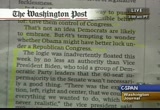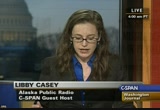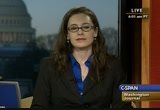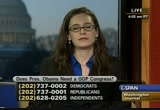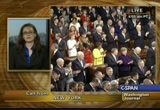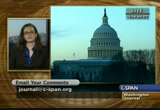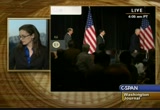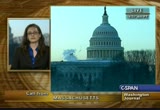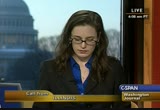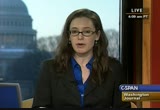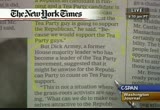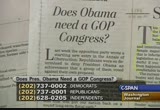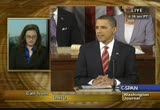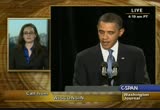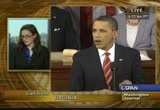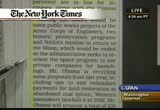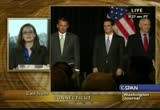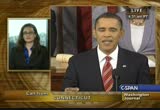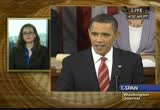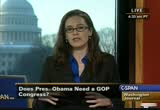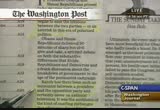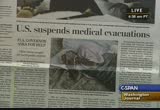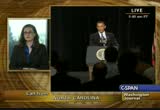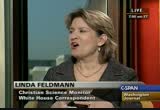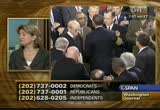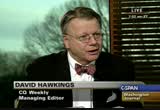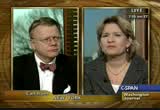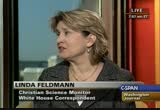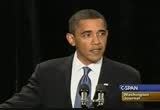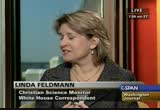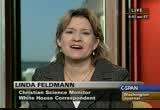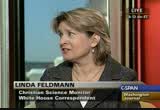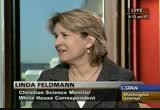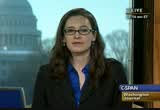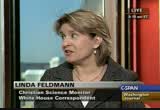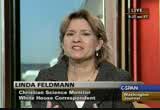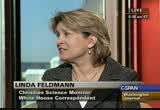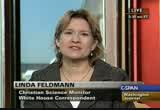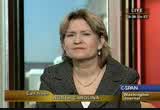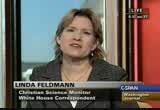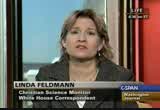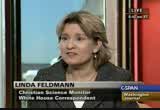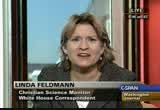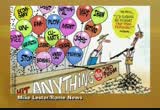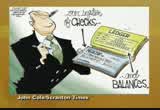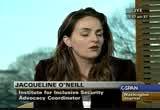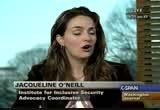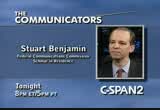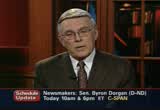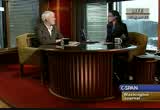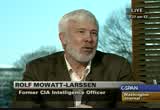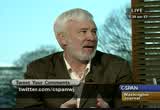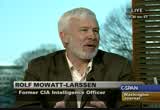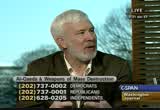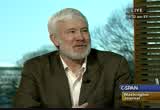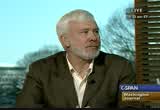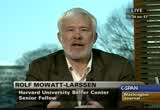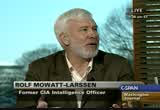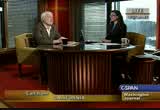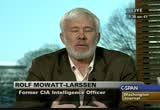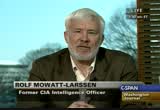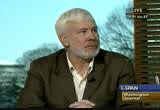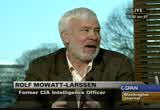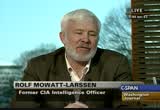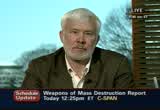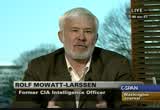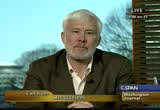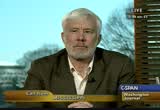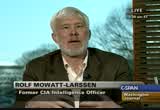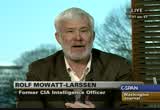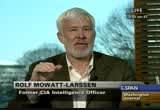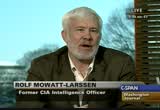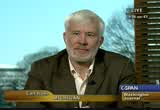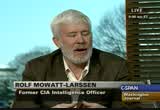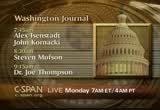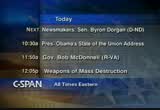tv Washington Journal CSPAN January 31, 2010 7:00am-10:00am EST
7:00 am
authority than vice president biden who told leaders that the 60-seat super majority wasn't necessarily a good thing. there was the expectation left, right and center that we could do everything we wanted to which was never realistic he said. with republican the republicaning can say they need not participate. having 59 votes in the senate means something for republicans. they are going to have to be accountable as well. .
7:01 am
party leaders were jubilant over a string of gop victories down, questioning whether they could take full of vantage." rose, democratic line, ohio. caller: hello? host: what you think? caller: i still think that there should be a republican in there. bill clinton had a republican congress and they turned him down every time.
7:02 am
they refused him. i did not want to mention it, but i have got to to tell how i feel about it -- this is racist. black is a color in the crayons. it is in there with all of the beautiful colors. host: i do not think i understand what your saying regarding race. does it come into play? caller: it really does. he is considered a black president, but i think they are going against them for a lot of reasons, and i wanted to say that black is a beautiful color that goes with all the other colors.
7:03 am
i believe the congress has not done anything, the same way with clinton. host: independent line, new york. hello. caller: good morning. the only color that really counts is green. do i think it is a good idea? i think it is a great idea. the cornerstone of the -- democracy is compromise. with one party in control it is all or nothing, and you see that that does not work. another issue that i think is important is a relic of the cold war, which is the tax system that allows corporations to go offshore and we subsidize them
7:04 am
through our taxes. they go to these countries that have very low taxes on their corporate profits, which allow them to keep most of their profits offshore. it penalizes us as american citizens. that policy should be changed so that if i make a profit, a capital gain online investment domestically, i pay a tax, whether profit was made offshore or onshore. as of 2006, the congressional research panelists believe that there were roughly, as of 2006, roughly $500 billion of corporate money offshore in corporate banks. that money should actually be taxed so that it offsets our
7:05 am
deficits and not making communist governments more profitable and despotic regimes more powerful. host: looking at this deficit of major concern in the legislative branch, we are talking more today about the president's budget. right now let's go to julia, calling from south carolina. good morning. caller: first of all, i would like to say that president obama is the president for all people , a democrat, republican, and independent. john boehner, the republican, said before they had their first meeting that they would not cooperate with president obama. he has extended his hand many times, he had a meeting with them on friday. president obama is the president's.
7:06 am
i think the republicans need to try to cooperate more. host: looking at this "the new york times" story the right "the republican party continues to struggle with ideology and tactics, as well as what party leaders call an absence of strong figures to lead it back to power." this is reviewing the meeting last week in honolulu where republicans met to discuss the future of their party. also in this, "gop envision in northeast come back, something that people thought could not happen, even one year ago. the northeastern republican was driven to extinction by climate change, but the species is now poised to make a comeback. looking at the front-runner status of michael castle in
7:07 am
delaware. he and other candidates might be making a resurgence in the northeast. let's go to massachusetts, where david is on the republican line. caller: good morning, how are you? i went to a function yesterday where there were 500 people. host: a good turn out. what was the mood like? caller: it was that we had to get rid of these democrats. as you just mentioned -- i do not mean to steal your thunder, but there is a conservative resurgence. not just republican. i would like to put a plug in for my friend, bill, who is a conservative republican.
7:08 am
host: are you still with us? i think we lost him. terry, independent line. what do you think? would you like to see republicans have more control over congress? halcaller: republicans are doing what they can, obama is fresh in the white house and he is just getting a look at what needs to be done, but on health care, i think they need to do things simple. each state gets $1 billion -- $1 billion for their colleges. with approval for doctors and nurses in case of an emergency, stimulating jobs and, the most important thing, creating taxpayers that will repaid the
7:09 am
loan. this is not giving away the money, this is giving back. they work for the government for their tuition to be paid back. if they want to go into a simple, private sector job, they are free to do so, as long as they pay off their student loan. that is all it is, a new policy for homeland security. this is all their decision anyways. homeland security would decide that school of doctors and nurses. they needed to go to louisiana or florida, they could always have buses that brought the people i could not afford to drive. host: a few moments ago one of the callers mentioned gop versus
7:10 am
conservative, and this piece does look at the tea party. "political principles verses pragmatism played out in honolulu in a sharp way. republican leaders succeeded in unveiling a resolution proposed by conservatives in indiana that would have required candidates who agree to a list of conservative physicians to get party support. jumping down further in the article, where tea party candidates were against republicans, mr. steel expects them to come together. if the republican incumbent or candidate is running and a tea party candidate is in the race, my expectation is that the tea party member would support the republican as we would support the tea party members. different perspective from dick armey, who has become a leader
7:11 am
in the tea party movement, who says it would be unwise for the republican party to count on tea party support. this is not a situation where grass-roots activists are trying to make themselves attractive to republicans. it is -- what can we do to make them understand how they can be attractive to us." phyllis, democratic line. nashville, tennessee. caller: hello. i think we need a republican congress as much as we need a toothache. how quickly they forget which party caused the economic downturn in the first place. who turned a record surplus into a deficit. how quickly they forget the party that kept down the minimum wages of those at the bottom by giving tax cuts to the
7:12 am
rich, tax cuts that we could not afford. do you want more of the same from eight years ago? what we need is a party dedicated to citizenship rather than partisanship. host: carol, republican line, hello. caller: i am not necessarily a republican, but not really. there are conservative issues, but i think that mr. steele is being disingenuous referring to republicans as reckless when they are locked out of committee meetings. hard to be reckless when you have no effect. host: let's go back to that column and get some more contacts for what he was talking about. "republicans were so determined
7:13 am
to deny president obama and achievement that they voted against their own proposal, asking obama for strong support to solve the national debt crisis, looking for lasting bipartisan solution to the nation back on a sound fiscal half. that proposal was rejected by the senate last week. that is what he was talking about. let's go to our next caller. what do you think? does the president need a gop congress in the sense that having two parties wielding power in congress would be a productive thing? or would it be obstructive? let's go to court royal, south carolina, where jennifer is waiting on the independent line. caller: thank you for c-span. it is important to have all voices heard, no matter what
7:14 am
party you are from. we learn from clinton that we have not been paying attention to what we are told. i think we have a tendency listen to the media and allow them to direct us the same way that a commercial would. unfortunately, there not necessarily telling us the truth, we need to learn the facts and make decisions based upon knowing exactly what it is that has been offered to us. we are allowing them to tell us what ever we want to and the assumption is that it is true. some of these things that are set for yourself, particularly with both parties telling you that this one is a socialist or that one does not want health care, if you actually hold them responsible for what they are
7:15 am
saying to us, many of these things can be cleared up for yourself. host: how would you like to see politicians held more accountable? caller: here in south carolina -- going backwards to them that, but some of us might remember when joe wilson said -- you lie. something that the president said about how immigrants would not have part of the bill he was talking about at the moment. once that was said, i look it up to see what he said. he did not lie. when you have joe wilson getting so much air on television saying that the television -- that the president lives without much of a response from the other side, i learned for myself that he did not lie. we need to stop and ask ourselves why joe wilson would say that.
7:16 am
why was it not countered? i think that the media has fallen short. unfortunately, we rely too much on the media to tell us both sides. host: republican line, jeanne, good morning. caller: i want to thank c-span for being c-span. i hope the people that look over the calls to try to review the line that people are calling on. i think that the republicans would be great as far as being in congress because i believe in checks and balances. i am a 65-year-old woman and a conservatives -- conservative for over 40 years. i was raised in a democratic home of my father would be appalled at the democratic party of today.
7:17 am
i truly believe in checks and balances and as far as people saying that they disagree with the president because he is black, that is foolish and i do not know how they can continue to say that. but as long as the policies are against defense, smaller government, business, and christian believes, i am going to go with the party who most aligns with my beliefs. right now that is the republicans. do i agree with everything that they say? of course not. i did not agree with everything that president bush said. but i truly believe that we need checks and balances and that people have to be accountable. host: julia, democratic line. lackawanna, new york. caller: the woman before this one about the media brainwashing us, we do not need another gop congress, we need gop real
7:18 am
participation. just let the president said when he was asked the other day about the republicans, if they do not get 100% of what they what, they do not want to play. they were in total control for eight years, ramming everything down our throats. now they are not in control and they still want everything we had before. tax cuts, tax cuts, tax cuts. host: let's go to a comment we got from massachusetts. "yes, democracy works better when balanced out between three segments, however, current republican leadership are more concerned with making obama failed and they are with improving the government." what do you think of that?
7:19 am
the president was invited to their issues summit, you saw it appears -- side here on c-span. there were exchanges for about 90 minutes. you can see this on your screen. let's go to our next caller in denmark. scott, an independent line. caller: he should have conservative members of the house and senate. it started to work really well when president clinton had that. i believe that they all got things accomplished and we were prosperous. as far as that first caller, it is typical progressive thinking to say that everything is races against the president.
7:20 am
but it is the progressive policies that he wants to take over the country. i believe that compromises would be better suited with, not necessarily republican, but conservative thinking. in the united states here, we have a gentleman in the state assembly that is under the democratic ticket but is also a conservative, many people also agree with him. i'd think it works better that way. thank you. host: looking at a piece from "the washington post, the race in maryland, what could happen? looking at what is happening there with more of an interest, the gop wanting to look good in maryland for governor. "a string of republican victories has raised the stakes
7:21 am
considerably for one of the fewer -- fewest 2010 holdouts. they will try to regain the maryland governorship, going up for that this year. in most likely will not announce until march. one of the races to watch. we got an e-mail from paul. "the gop is toast and they do not know. they will lose the senate seat in massachusetts and more in the next cycle and the only votes they will get are from those who have not followed what is happening in that vote along party lines. -- a party lines." lexington, ky. what do you think? caller: we have had some version of one-party rule from both parties. we need to control government spending.
7:22 am
$500 billion of money offshore? he suggested we should tax that money to bring down the deficit. if that money is going to come back to the united states, taxing it is the last thing you would want to do. you would want to lower taxes, allowing companies to take their money to the other countries, and come back. host: ok. let's go to roger, democratic line, richmond, virginia. caller: how are you? host: fine, thank you. what you think? caller: the state of the union address reflected what was going on in congress. the american people are starting to understand that republicans have been stalling, that house republicans have been the most harmful to the base.
7:23 am
the gp going out of -- going up 5% as one of the signs that the white house is putting us in a good direction. i feel that the democratic base is already campaigning on hating wall street, coming to find out that the governor of new york is actually, you know, david petraeus is in love with wall street. one of the corporate thugs. definitely showing at the white house that long before this came to light, they were for the people, the middle class. it is not about republican democrat, they are just trying to get things done and the republicans are stalling. host: ronald, philadelphia. caller: why would you with the same people that got you into bankruptcy, foreclosure, back into office?
7:24 am
seems ridiculous. here is a man trying to get things back together. they toured a civil wrong country for more. -- they took us to the wrong country for more. -- war. host: thank you. we will find out more tomorrow about what president obama's budget looks like. we have this story in "the new york times" that says "the budget for the 2010 fiscal year will identify the winners and losers on the three-year freeze by portion of the budget. the national institutes of health, the science foundation, and the energy department are in line for increases, along with the census bureau. also, public-works projects, historic preservation programs, and the return to the moon by
7:25 am
nasa, which would be ended if private companies were used for launches. keeping this in mind, national security, social security, and the most expensive growing areas of the budget. a bit later in the article, of the president's budget, an ambitious plan in congress to go over the nation's health-care system, making significant reductions in medicare spending. we will find out more about that tomorrow. danny, republican line. caller: hello. i definitely believe that the gop should be in control of the congress. i would like to explain why. in the 1960's, a former fbi agent after he retired wrote a
7:26 am
book called naked communist, where he documented the 45 communist goals to take over this country. it was going to be from people that came over from communist china and mostly from the soviet union, attempting to infiltrate every place of influence in this country. you can look it up, communist goals, 1963. compare the goals of the communists to take over america with the political party platform of the democrats. you will see that all of those objecting to the total world government under the united nations has been fulfilled.
7:27 am
you can read what our founding fathers believed was the principle that this country was founded on. that is what the base of the gop stands for. host: one more thing about the budget, he added there were plans to slash future shortfalls with employees hitting the brakes. -- the brakes." going to our next caller, democratic line, westhaven, connecticut. host: -- caller: good morning. i think that our problem is not the gop, generally speaking, our democratic. all of this fiasco started when,
7:28 am
as an example, i voted for president obama. changes, corrections. he wanted to propose $300 billion to small business to create jobs. what everyone is forgetting, originally, when president bush announced a $750 billion stimulus package that would go to banks and so forth, some groups suggested -- why not give every family 100,000, $125,000 to $150,000 m of families will then pay off mortgages, purchase new cars, turn over old cars, helping to pay off some of the debt of the children in college.
7:29 am
it was shot down with multiple excuses. now, we know one thing, when i went to wallabies big businesses, banks and so forth, big bonuses and everything went out. administrative expenses, i would call it, they had nothing for the people. what is happening now, loss of jobs and problems still remain. since the president was elected, he still wants to give to small business to create jobs. in the beginning, they would have saved hundreds of billions of dollars. host: looking at the prescription section of "the new york times" there is a series about making sense of the health-care debate.
7:30 am
"president obama has blamed many factors in the difficulty in overhauling health care, he also commonly blamed lobbyists. taking them to task last week he cited special interests as armies of lobbyists for partisan politics. those that favored an overhaul spend more on advertising and the ones who oppose steps according to the chief operating officer of the campaign media analysis group, which tracks campaign commercials. the question of which cited the issue is a lobbying happened on, health care insurance lobbyists
7:31 am
spent $640 million in 2009 according to the center for responsive politics. the center has not been able to process 20% of their lobbying reports, and an announcement on any other issue in a single year." charles, independent line. connecticut, hello. caller: hello. host: you are on the air with us. caller: you know that the state of the union speech that president obama gave the other night was really interesting. here we have president reagan, a good politician. we have president obama, a politician that is a better actor. i could not believe that that was the same president talking
7:32 am
as when he was trying to be elected. he sounds a lot more conservative, or even more of a centrist than anything else. he is trying to appeal to everyone, which is a big problem, i think. going back to wasteful spending, $79 million to the moon when people in michigan are running out of food? come on. host: do you think it will help to balance of the congress with more republicans? caller: of course it was. remember 1996 when newt gingrich took over congress and controlled spending? that is what made clinton look good. i do not believe he was a good president, i think we had a good congress. host: let's go to joe in south
7:33 am
carolina. caller: your republican callers are constantly blaming the democrats, but one of the court purposes of the republicans was expanding housing to low-income people, causing the meltdown and fannie mae and freddie mac to go under. low-quality standards with taxpayers bailing out. for them to stand up there and act like they had no fall in the meltdown, it blows my mind. for democrats to forget so easily, chris dodd, barney frank, it was republicans as well, but do not just put it all on the gop. i get tired of hearing that. host: what was your take away
7:34 am
from the meeting between the republicans on friday and the president. do you think it brought them closer together? caller: i think that it is nice to see them talking, but obama cannot make deals with them. 25% of the population got him elected. he cannot do tort reform because of his alliance with trial lawyers in his party. i do not think that he can work with republicans, they're just not in sync with each other on simple ways of viewing how society should be run by the government. host: on this question of president obama and house republicans, in the take from "the washington post," he asks "will be a moment that eased tensions or an asterisk in this
7:35 am
era of politics rarely has there been such an encounter between a president and the opposition party and certainly never run national television. it was the antithesis of the kind of starling exchanges that often pass for a local dialogue, the between strategists of parties, candidates in a campaign, or the worst of cable television. what other confidence-building members might be offered, the white house official said that he did not know the answer of the top of his head, but one of the most important things is to continue the dialogue. it is hard to go beyond dialogue if you can even have a dialogue. that will be the next test for obama and congressional leaders of both parties." stephanie, california. good morning. caller: i wanted to remind c-
7:36 am
span listeners, and i also wanted to say that i cannot wait until november, to get out and vote. i think that republicans, they never stopped campaigning, whereas the democrats got comfortable because we had that house and senate and president in their. i think we need to get another get out the vote, getting out there, there are more democrats than republicans. we need a congress that is fighting for the actual american people, not for themselves or the rich. host: do you think that the democrats will change anything in their message? have they learned anything from the loss in massachusetts? caller: let me finish my point. republicans are for the rich. we all know that.
7:37 am
they keep reflecting back to bill clinton paused presidency and how successful it was in the congress with a republican congress. let's reflect. the republican congress pushed through nafta, which bill clinton signed into law. that is what happened with a republican congress and a democratic president. do we want that again? yes, i enjoyed the meeting that president obama had with the republicans, clearing the air, showing that everything they were saying was a lie. thank you and have a nice day. host: walerga, independent line. texas. caller: good morning, c-span. thank you for everything that you do. what we need more than anything
7:38 am
are people in congress that represent their constituents. i would like to see a lot more independent candidates in congress. i was listening to your caller and it was like listening to a friday night football game with democrats on one side and republicans on another. i want to see accountability. i would like it posted somewhere where everyone of these congressmen and senators, how did they vote on particular issues? not only that, but every dime that they take. who took the health care lobby money? where did it go? maybe the public can get out and register to vote. we can decide whether we need democrats or republicans, but we need is people representing all of us. host: looking at some of the other headlines in the news today, this was in the world section of "washington post."
7:39 am
"florida governor asks for help dealing with victims from 80. the u.s. -- victims of for haiti. state hospitals are becoming too crowded, according to officials. a couple of other stories, sanctions for bush lawyers that cleared waterboarding, waterboarding of terrorism suspects and authorities, there will not be any sanctions according to a forthcoming ethics report confirmed by one source. four afghan soldiers, killed in an airstrike. american afghan forces called on and it -- an airstrike on a check point yesterday, killing four soldiers."
7:40 am
those of some of the other stories going on this week. eric, republican line, north carolina. caller: hello? host: good morning. caller: thank you for taking my call, c-span, you do a great job. i wanted to respond to that lady democratic caller. that type of attitude, using rhetoric like the republicans are for the rich, that is so polarizing. i agree more with the independent scholar. -- caller. obama definitely needs to balance having a gop congress. i think that it allows for efficiency. issues come clear to the floor.
7:41 am
at his heart he is an idealist. i think if he is in danger of falling to the idealism held by jimmy carter. i think he really needs to utilize the gop congress. that type of balance would be beneficial for the country. host: do you think that they can work together effectively? did you get the sense from that meeting? caller: i think that they can, and ultimately i think that they will. i think that when you start to look at the kind of polarizing talk -- that republicans are for the rich and democrats support the regular people, i do not think of that is true. it is not that polarized. obama realizes that if he is going to be successful, he is
7:42 am
one to have to utilize a gop congress. if he understands that, hopefully people will start to see it more. host: headlines coming from around the nation, "four years after his death, a place of honor for a marine lance corporal killed in iraq four years ago." in "the chicago tribune" police aren't -- the courts are looking at the legality of a gun ban case. taking a look at the sunday version of "the denver post," "budget woes in painful cuts." taking a look at one more headline, "the pittsburgh post- gazette," "57 years in
7:43 am
congress, over 90 and still fighting, senator byrd." lisa, good morning. caller: hello. i always find it interesting that republicans called polarization anything that the democrats say, but they do not think words like communist and socialist are polarizing. my thought, of when bush was in and the republicans, after the election, everything that went wrong was blamed on the democratic congress for the last two years of his administration. i guess that if we can get them in, we can blame everything on the republican congress. host: elizabeth, independent line, ohio. host: what do you think? will more republicans in
7:44 am
congress help? caller: they have got to put their attitude towards what is best for america and the people. they have to work together for the good of the country. it seems like people just do not want to get along. i think that if the american people realize that the democrats and republicans in office, senators pay about $280 per month for their health insurance, for the best policies. the american people pick up about $900,000 of that for them. they are straining so long so that we will not find out what they pay. since this entire mess started, i lived in a house in
7:45 am
charleston, ohio, for $1,300 per month. for eight to nine months, my landlords to my money. host: we cannot get into personal experiences there, but think you for sharing your thoughts on the topic at hand. coming up next we will talk about the week in politics, also taking a look at the week ahead. we have our white house correspondent, linda feldmann from "the christian science monitor" and david hawkings from "congressional quarterly." >> coming up on a sunlit politics shows, health care, the economy, in the moving of the 9/11 trials. john boehner will be on nbc. on abc, guest host barbara
7:46 am
walters will be speaking with scott brown. on "fox news sunday" they will be speaking with evan bayh, lamar alexander, and chris van pollan. as well as wisconsin republican, paul ryan. on "face the nation" bob schieffer will speak with john boone, grant hall, and edward bell, as well as haley barbour. "state of the union" is hosted by john king on cnn, including mitch mcconnell, and robert gibbs. you can listen to all five of those talk shows on c-span radio starting at noon.
7:47 am
also on the web at c- spanradixdo.org. follow-ups on twitter and facebook. >> today, byron dorgan talks about whether or not the president made a mistake in putting health care in such a high agenda place in the last year. >> do you think that he made a mistake? >> i do. not because health care is not important, but i think that the timing was not good. ñispending in a deep hole, it is hard to reach as high as you need to reach to get a proposal that will go through congress. personally, i would have said to work exclusively on economics again, putting people back to work. i am sure that the president
7:48 am
will say that he was working on that as well. look, the president won the election, i did not. his position is that you cannot fix the economy without fixing health care. we found it difficult to get a menu for health care changes. both >> you can see the entire interview today on "newsmakers" on c-span. >> this weekend, on "book tv," the political cartoons of dr. seuss -- published in the 1940's. also, the growth of the muslim middle class in the middle east. as well as neocons and federal foreign-policy going back to the nixon administration. get the latest updates on
7:49 am
twitter. >> "washington journal" continues. host: our guests are linda feldmann, "christian science monitor" white house correspondent, and david hawkings, "congressional quarterly" managing editor. is the president unveiling things early on in the week to benefit middle-class americans with this reunion, and ending in a meeting between republicans and the president, did he come far in the past week? caller: i think if he did. -- guest: i think if he did. having a state of the union, which is always a big event, then that move -- that meeting between the president and the republicans. what did you think? guest: were you in baltimore belli guest: i had to watch it
7:50 am
on television. host: elevated both sides, many will be talking about who is winning -- winning and losing, but obviously, the president, by going on television, insisting that it be on television, he put them on and he proved himself as more bipartisan than others in the democratic party. host: what has been the opinion of the house republicans? do they feel that they got something out of the miss change -- of the exchange, was a mistake? guest: some people feel that obama kind of one in the they do not want to do that again anytime soon. as the president he had command of the issues, as the person
7:51 am
getting these house republicans together, maybe 140 of them? he could interrupt them, they could not quite interrupt him. in the end, they do not see this anytime soon happening, but i would love it if they did. host: you wrote a piece about obama -- "can he get his mojo back"? what do you think? caller: it was not -- guest: it was not so much obama from the mountaintop, he was being conversational, looking into the chamber and looking at the reactions. some people objected to his approach to the state of the union, talking about it more as a state of the president. stephen counted, he used the
7:52 am
word i 72 times. he was also a speechwriter for eisenhower. he said that if eisenhower had written that kind of state of the union, his head would have been handed to him. liberals loved it, conservatives did not. that was the standard. but, looking forward to the baltimore session, he was off of the teleprompter, unscripted. that is when he got his drive back. guest: of this whole thing about television, he got a lot more time on television and the has recently. wanting to remake his image, it is amazing how the voters, in his brief christmas break, the president's gets to reintroduce himself, that he can do that as
7:53 am
the bestin the world is something. host: of the guests on "newsmakers" is evan doracon, let's look at his statements. >> the president made health- care his signature push, was that a mistake? >> fighting it was. not because health care is not important, but the timing was not good. spending in a deep hole is difficult in terms of putting the other reposal begging get through congress. i especially might have said working exclusively on restarting economic interests to get people back to work, i am sure the president would say that he was working on that as well, but i would have said that first, health care later. but the president won the
7:54 am
election, not me. his position was that you could not fix the economy without fixing health care, and there is some truth to that. host: steven? guest: interesting, now that he has announced that he is retiring, he started sending these signals as early as last fall that seem very discord andaant and prescient. saying that it was a mistake to buy this of at the start. maybe they will have to go to someone else in the caucus.
7:55 am
guest: it is significant, the white house does not want to cure that kind of thing. it is important for there to be some kind of discordant voice. not everyone can be marching in lockstep. i know that that is the ultimate goal, but this is a democracy and there needs to be range of views. the republicans have been very good at hanging together, but they are in the minority, they have more of an incentive to speak in one voice. host: lawrence, buffalo, go ahead. ñicaller: thank you. please turn down your television. caller: i did not understand the question. host: you are on the air with our guests, what is your comment?
7:56 am
caller: i felt that the debate between the president and republicans was fairly good. i was just wondering why the republican party has gone in lockstep against everything that president obama has attempted to get through? host: let's go to david. guest: two major reasons. one, they genuinely disagree with the things that the president has proposed. clearly, there is an ideological gap between both sides. republicans also decided early on that it was good politics for them to raise a unified opposition pushing politically into the midterm election to say no. a chance that any party on the other side from the president to make gains in the congress in
7:57 am
that first election, a is a historical pattern that goes back 100 years. the party out of the white house in the first midterm election, that is the only way that people mad at the president can express their opposition. host: what might we see now heading to the elections? up we just came off the state of the union and this meeting on friday, can we see the republicans saying as conservative? guest: they have more incentive than ever tuesday cohesive, which is the irony of the bipartisan push on friday. i do not think it moved anything forward in terms of peeling off republican votes. republicans said no one year ago what obama was popular. now they have won the
7:58 am
massachusetts senate race and the gubernatorial races from november, they are on a roll. they are not going to change strategies now. host: let's look at a clip of president obama speaking to republicans on friday. >> if you were to listen to the debate and how some of you went after this bill, you would think this is a bolshevik plot. that is how you presented it. i am thinking of myself, well, how is it that a planne that is pretty centrist -- look, i am just saying -- i know that you disagree, but if you look at the facts of this bill, most independent observers would say that this is what many
7:59 am
republicans -- this is similar to what many republicans proposed to bill clinton during his thing on health care. all i am saying is that we have got to close the gap between the rhetoric and reality. host: that was the president talking about the health care plan that stalled out in congress. your thoughts on what he said? guest: it is interesting. one of the problems that republicans have with him is that he is very liberal. later in the session he said that he was not an ideologue. there was murmurings in the crowd like -- oh, really? report -- conservatives see him saying that as nixon saying that he is not a crook. obama sees himself as a centrist
8:00 am
and a pragmatist, and there is some evidence that that is the case, but even also point to aspects of what he has tried to do to show that he is very liberal. host: do you feel that he was able to communicate his message? guest: through the town that he took in the senate, you saw it in that clip -- you do not see the republicans reacting. there were murmurs in the room, reporters saying that there were amazed looks. all they saw was the president basically trying to manage, and in that sense he did. .
8:01 am
t( caller: i in upstate new york look at obama's discussion with the republicans and think that was made çfor tv politics.ç don't buy into it at all, he's trying to rally his group. then i look at the state of the union, and i wasn't terribly impressed with that. what i look at is the fact that the democrats lost
8:02 am
massachusetts. their senate seat.çóç ted kennedy's senate seat in massachusetts. they lost the governorship in new jersey and virginia. and frankly i am looking at new york politics they will lose christian's seat, andrew crono like his father, people are worried about money. we are worried about health care and other incidentals in life, but we are really worried about money. when you have one political party in power, we watched them self destruct. we watched the republicans do that for six years and now the democrats do that. he had a total majority for one year and couldn't get his health care bill through. host: let's çget our response.
8:03 am
guest: you are right, he's had the largest majority since jimmy carter and couldn't get his signature program through. and now one of the things happening in the last week, clearly, is that he's trying to put that on the back burner and move on to some other things more difficult, taking on the money question and jobs question and even more difficult than that, a deficit and debt question. but in order to do that, he's signaling the only way to get that done is to work with congress and give the problem to someone else, to create an independent commission and with republicans and democrats on it to come up to chip away with the enormity of the debt problem. if he gets this done and the republicans in congress agree this commission will get an up
8:04 am
or down vote, this would be as big as legacy for obama as the health care. host: you see the president taking this in his own hands, how would he do that? guest: it looks like an executive order, the republicans are not happy, but he's the president, he can do that. guest: right, they will come out after the election and no nail shut, because it's by executive order, there is nothing that the president can do by executive order to insist that congress vote on this commission proposes or amends what it proposes. so only to make it air-tight is that all the congressional agree to take this package and
8:05 am
accept or reject wi9"uu(s% that's the magic of these commissions that started çin t late 1980's, why they worked because congress could accept or reject but not alter. host: there was some push back for republicans coming up with ç ideas but ultimately did not vote for it, can you talk us through that? guest: i can't, it goes back to what we were talking about the republicans in their best interest to vote against what comes up, and another amendment on the floor the pay-as-you-go requirement but something they advocating in the past. we clearly have a long way to gn0for bipartisan peace in washington.
8:06 am
host: good morning to scott. caller: just one comment and half çça çquestion, this pas the presidential make-over and what they are trying to do, that looks are effective and there seems a different air and confidence and the projection of optimism. the problem is though, policies will have to change in this bipartisan acting like we are reaching across the aisle with the tv cameras on. until you roll your sleeves up and go behind the same closed doors of democrats, that's not going to accomplish anything. until he rolls his sleeves up and encourages the house and senate to sincerely work with the other side, until be change, we will talk about it
8:07 am
and sound good and look like great political theater. but other than that you get the3 same disagreements and same ideological differences that keep us gridlocked. host: did you have a question scott? caller: the question is, what do you think about that?t( guest: something important is w3 happening, the democrats çdon' have the çsupermajority in the senate.çç which means that the democrats ç can no longer push through what they want to send for democratic vote. by definition this means if the white house wants to get something big through the senate, they have to get one republican vote. and that will force them to invite republican ideas and meet with republicans. there is some objection to this idea of just cherry picking xdiñ few modeváe republicans, and there xdare only a few.çt(ç so ççthe w3republicans are sa really listen to all of us, not
8:08 am
just the qfew moderates. but the democrats can't just push through any -- they couldn't anyway. there are some modest democrats in the senate. and this idea that the supermajority i]of passing anything was false, as you saw the troubles with the health care reform. guest: right the ñrqlarger and truism of congress, t(the bigge the majority çgets the çmore ideological diverse, the more in the house and senate, the ç more çat the conservative end and liberal end. the way i]çthat the w3democrat their majority is winning the republican territory. and some çmoderates and conservatives t(on the fiscal matters have succeeded politically by being able to go
8:09 am
this route.çç it was -- çóçi was guilty this an editor ç-- to çoversimplif this majority. host: let's go to shirley on % democratic line in atlanta, georgia. good morning. caller: good morning, thank you for taking my call. i wanted to comment on çthe we watching the presidenti] and th republicans in baltimore.çççç !@wwas amazed and have çnever seen anything çlike this. but ççwhen i listened to the callers and comments, i think sometimes we mymust ççhave ç a different show.ç it's like did we see the same thing. and çi think it's not so much about what we said, but we come with what we see and we have
8:10 am
already pre-conceived notions and walk away çwith different opinions of what happened.ç i thought the president was excellent.w3 and i even thought the republicans xdçwere ççw3w3gr no yelling. i was grateful for opá. i qçreally ç[çwas, it's not w our country. i think what we see is what we believe. guest: you are absolutely right and it's a challenge for people like us sitting çaround this table to check çthose perceptions and beliefs. sometimes subliminal and self conscious çto be checked at th door before you leave for work.ç it's tough to do. you are çright the qi]interestç point about i]ççthe "you lie"ç republican that yelled that out. i think that's the last time
8:11 am
you çwill hear that, the electorate has made it xdclear they want t(the parties to get along, çthey want civility ç our politic. and that çwas a marker for the point çthat w3the qçpublic ' think that either side should go. i think the republicans absolutely i]çwere çñ;ççç behavior.q?;ççççççw3okxdó republicans t(w3and democrats republiche office of the rats presidency. and çxdthey are not going to s up çon tv or behind closed dooç and being disrespectful with a president even if mythey disagrç they xdknow that's bad politicsç and respectful enough of çthe ç profession they are in, they won't disrespect the president that way. host: it seems that çthe camer were on congressman wilson.çç
8:12 am
8:14 am
guest: the tension between the right and left, çcalling t(i]t decision betweenç bush-gore, aç the ymmoney and flood of the elections çand the rule the party is reduced.xdç and çother i]çpeople are sayiç wait çça ççojç÷minute, corp get their çómoney into election byççt(çw3ç donating in the . there will be more money in campaigns çand çnot çthat ti wave in elections. ç andxd ç obama as a senator vot against qzvçalido, and that ma
8:15 am
8:16 am
clinton's second term, 15 years ago president clinton went qint his mid-term election year, better. and that was the rise of newt tha. the period of çw3the qmid-90's when we w3had welfare i]reform, lead to ]he çfirst period of - surpluses çthat we çhad since 1960's. sometimes divided government is the time for big things. host: we ççqqhad a twitter,ç americans areççç politicallyç moderate but politicians don't 3 win by thatçççxdçi] attitudç çça okw3tea ñr
8:17 am
party çsummit coming$çup soon,ç are we çlooking at more of okç the çparties ç trying çto çget this fired upr ç guest: this another reason why bipartisan is not in our immediate future. guest: i çthink that's true. and it's the case that this te' political story of the year. yes, there is this big meeting
8:18 am
in çnashville, where the tea party movement is a loose affiliation of groups around the country. they are having a hard time getting that off the ground. a coupleç members of congress has backed out. and xdunder criticism for v/x÷p sarah çqpalin ç100,000 to spe and to çthrow ççw3w3t(okthis isçi] not wise. guest: just because of this çzç for-profit t(eventkñit doesn't mean xdçthat çççççthe çóte movement is in decline. it's a locally based movement uóthere are many çaround w3th country, and they have shown to
8:19 am
grow in their political savvy. you had the upper new york congressional race where they pushed for the conservative and maybe went too far. and you saw in massachusetts you had scott brown, a moderate republican, getting tea party money. they are not just pushing for the hard-right or the kind of i3 ross yof people. host: let's go to our callers, z hello, wendy. caller: good morning, i am calling on the republican line but i am considering leaving the party because of the uprising of the tea party and the move to the right. and i don't feel there is çmuch room for independent thoughts as far
8:20 am
as the party is concerned. my question goes çççback ikmd friday night u!event and both guests made points while the republicans brought ideas, and they did to the president respectfully. there is no incentive to make changes or consider different positioning when i]it comes to voting. i believe that david said okt( would remain locked because it's in their best interest.ñr is that ok?ç are we ok with that as long as this is in their best interest, i am talking about republicans or çdemocrats, that it's ççtç 8ñm
8:21 am
people in america that çbeliev tz w3çiñw3ñrfg#çbpreeent ht make matters worse. when you ask if it's ok, it's as old as the republic to get in the way of what the president wants to do is in honest pursuit. host: there is questions about bernanke and about voting against him, what çdoes that mean?
8:22 am
guest: ben bernanke got himself caught up in the frenzy of the role of the government, when the economy was in the financial situation melting down. and he was the target of populous on the left and right. and some concerned about their re-election chances in the senate, they decided to come after him. a lot of people thought that was unfair, but this is politics and some category that if tim geithner went up against them, he would have a hard time. but luckily he's already in. host: let's go to our caller in north carolina. caller: hi, have a question for either party. why can't congress do a by line-item voting and go back to the people and ask their state
8:23 am
what their vote is, and only allow them what the state voted and this would stop corruption. guest: that's interesting. that would be complicated and wouldn't make being a member of congress fun. i think what the founders of the country would say, having house elections every two years is as good as you will get on that score. your district, the people that you represent have a chance to vote or against you every two years, that's as good chance. host: our guests, david hawkings and linda feldmann. something that the president brought up in the state of the union, don't ask, don't tell. we will see that play out in a hearing on the hill. was it a surprise that he
8:24 am
brought this up? guest: before the speech and before the prepared remarks were released we heard that he was going to say this. and i thought, gosh, isn't that a little risky. the whole pre-state of the union mantra was jobs, jobs, and those issues. to me it felt a little risky. but in the context of the speech it wasn't that striking. he said in the campaign that he wanted don't ask, don't tell lifted. and didn't give a time frame, no one expected it to be removed this year. eventually we will get there, and i think he handled it in a way that it didn't blowup in his face.
8:25 am
host: i heard members that w3thç want to çhear from the militar. guest: i believe it's secretary gates that will approach this on tuesday, it's a budget hering, -- hearing, we still haven't discussed that hearing. and democrats are eager to hear people in uniform discussing this, and hopefully, from the point of the view of the president and democrats and say that the policy isn't working and the culture has changed enough since clinton was compelled to accept this as a compromise. i predict it will happen this year. i think that maybe it's my naivity living in democratic ç w
8:26 am
caller: i wanted to talk about the transparency issue, i don't know why you aren't screaming from the roof tops, can't we get onboard. and myi love michelle's christm tree with [inaudible]. host: i am not sure we understand that last comment. linda can you speak to that? guest: this is a talking point of being transparent. and çñrthey have çów3released
8:27 am
memos and logs. and one thing that is harped on and the final crunch on health care reform was not televised on c-span, so they were a player as well. they get a mixed view on transparency but a republican who is expecting at every turn that they will be completely -- the white house is saying we will be transparent about our decisions and what they mean. not on the making of those decisions. host: not on making the sausage. guest: and the president at the famous friday meeting was self-critical that he had overspoken or overpromised and they had not played that well. and he probably shouldn't have phrased it quite the way he did.
8:28 am
but clearly the public is clamoring for a lot more transparency. the public does not like this culture of back-hand dealing. the democratic leader did not help that cause by holding a bizarre -- bazaar, horse trading for the health care bill and saying at one point any senator who did not come to see me made a big mistake. host: tracy, welcome to the program. caller: good morning, i have a question when i sit and watch this politics on television, i hear that the republican party is the party of "no." it resonates with a lot of people because we are wondering why the democrats are not the party of "no" when the majority
8:29 am
is yelling in polls and tea party movement that we do not this health care the way they present it. but the democrats are saying no, saying no we don't want lawyers to contribute to the cause with tort reform. and no, we don't want the american public to have true competition by vying policies across state lines. and no, we don't really want to tell you the truly by -- telling the truth on c-span and not allow the substantive amendments that the republicans presented. we will not allow them to go to the floor, and if we do, the democrats turn them down. we saw that on c-span. it was ridiculous. guest: that's an excellent point, you get the democrats
8:30 am
voting at the block and republicans voting at the block. i have been here for 20 years and have never seen anything like this. the obama white house their m.o. is to say we do this, we won the election and have big majorities in congress, and we do this and pass it and implement it. just because congress passed it it doesn't mean it sits there, no reform goes through perfect the first time. i think that the white house could see those poll numbers going down, but their feeling that we have the supermajorities and their original plan for the state of the union was to sell the health care reform they had passed. well, they didn't work out.
8:31 am
the massachusetts election was a huge canary in the white house, and they believe they can lose majority in the house, in particular. so i think their lock-step movement may be a little less sure thing. 3ççmost in çw3w320 ççg#çóqyears, çt ñrççcongressional quarterly, we measure this every year. and you are right, we calculate how often most republicans vote against most democrats and how often are most votes party votes of all-time high in the house and senate. yes, we çok(áqçokyççñmrça wç prf,=u9uzar!4záion.ç some people are calling this the post office congress, the congress this year that will
8:32 am
only succeed at naming more ç postoffices for fabled çólocal heroes, it could be a pretty dry year. host: champagne, illinois, john is on the democratics line.ç caller: how are you doing, i enjoy your show. i was wondering when çççóbara invited ççto that çretrep laç week, was w3it to çbe embarras or to trip him up on questions? because he çóreally nailed the whole retreat and i was impressed with that.çw3okçi] host: the political motivation for inviting him?ç guest: i i]çdthink çthere wa surprise when he agreed to do it. the political motivation çof inviting him amongsome ç --
8:33 am
amongsome was to trip him çup, and it çwasn't the republicans idea to put him on television.ç the white house as i understand we insist this to be on tv, this is éda transparent moment and to call çthe republicans bluff.ç host: çcan you ççççxdsee o p bayener invited him to attend? guest: yes, i çthink they wereç delighted to [zkhand ;ççyçç proposals çand read them.w3 jíñ7 ä'+ç brush past çóokokçu!zg7vo/g/rá any çççpolitical u!ççplaye attention of the president, and house republicans all the more. host: let's talk about t(the çç budget, linda feldmann, there
8:34 am
is w3xdtalk about discretionary freezes but i]a lot of things will be spent on and having increases. guest: right they told us çthe would be a three-year freeze on discretionary budget, that's only one-sixth of the budget. and saying that they can save $250 billion over 10 years, that sounds like a lot of money, but when you boil it t( down, it's not wsta huge çamou( but symbolic cuts. and talked about what they çç would çw3çqçqincrease, ;p' education and civilian research and the corp of engineers will take a huge hit but no one loves them. guest: yeah, this is $250 billion sounds like an enormous amount of money except in the context of the entire budget.
8:35 am
the deficit for this year u7is expected $1.4 trillion. the debt çwe just watched the congress vote for increasing it nd çokçqthat ççis $9,000 for every second. that's a lot of money. every second. and i have been alive for 50 years, that's a lot of money. so 250 spread out over a long time is not that much. and it's one çreason why the discussion of the deficit and debt condition why taking on such an enormous problem will require óeñpolitical will on bo sides if nothing else to turn over to someone else. host: jerry on the independent line. caller: good morning, i really
8:36 am
enjoy watching your program. and just teaseingly i am going to say, i believe that the south will take over again. because there is a lot of carolinas that get on. and çdavid mentioned an olive branch, i believe that as long as pelosi t(is in there, that it's a controlling party that controls the bipartisanship.ok and had they not been behind closed doors, even with the health care, a lot more would be accomplished, i am not saying it could pass. i would like to make okanother comment, it seems they want to z throw something to the wall and see it stick. why are they determined to do the trials from people from gitmo and the states. they have expressed it will cost $2 billion to accomplish
8:37 am
this. i don't know the figures for gitmo, but i guarantee it wouldn't come close to that, and this is only the beginning of this type of trial related to the terrorisms and the war. my question is do you believe they may change their attitude or approach? in the time of saving money, 2w billion is huge for five people. guest: the caller is referring to the announcement two months ago that the trial of the master-mind of 9/11 would be taken place in lower manhattan, and this is agreed upon by political figures in new york.
8:38 am
he hit us here, let's try him here. and once the price tag came out, $1 billion or $2 billion, people went whoo. and we had that attack at christmas, that reminded americans that we are under constant threat of terrorism. and the public view qof çthat trial taking çplace in q'offk manhattan, shifted to, not in my backyard. and this goes to the president qdllñ(p)dyrñççyo3.áu!63ñrç
8:39 am
guest: in the çface of 9/11 an this okis too much. host: and speaker pelosi's name came up in the summit. guest: it did and the president did not come to her defense. speaker pelosi has an enormous challenge on her hands to manage the democratic caucus, it's a diverse caucus and she's not paid much time at all trying to get republican help. it's the difference between the house and senate. in the house a majority of one is as good as a majority of 40.
8:40 am
and all she needs is 219 votes and that's all she's gone for. she's spent the last year calibrating the number of democrats allowed to vote no. and she's done her job. you notice from the state of union night that the president paid homage to pelosi and she beamed from behind. she's done her job and has paid the republicans almost no mind at all and it rankles them and it's the way of the world. speaker gingrich didn't play the democrats too much mind in the 90's. host: let's go to the republican line, welcome. caller: good morning, just a couple of points, for the life of me i don't understand why it's president obama getting
8:41 am
all the credit for the republican caucus when he was invited. and it seems that obama is getting all the credit when it's the republicans being bipartisan. and that obama insisted that the cameras be there, ççit demonstrates to me it's more symbolism over substance. guest: it was a symbolic move oth sides to air their points of view. in an usually lengthy and public setting çç, in that se caló to who won or lost.ççç i çóçnbthink çthey w3both çw johnç boehner and his team is
8:42 am
what the viewers want. to listen to the other side and in that sense i thought that the republicans came across looking good. guest: obama played a little political drama of being put on tv. and that the skepticism this was for show. it's almost like a therapy session, these are people who have been in a bad marriage and not talking or looking at each other. and you put them in a room and you never know what will happen. who knows if obama in the future could peel off one republican vote because of that personal contact. and after the question and answer session was over, obama ]
8:43 am
stuck çaround and signed autographs for w3some of his mo vocal critics, paul ryan brought his children and obama posing for pictures. and it was a moment that these are just people and we çlove o country and trying to do the best we can. and there is not that much personal interaction between parties. guest: that's right and obama knows some members better than others. george bush came to washington without having served in congress and didn't have that intimate relationship. president obama the first president that came from congress since jack kennedy, knows what it's like to be in congress. there is a recipe for more civility than we have seen in a while. i think the republicans are seeing that and i think they want to set the tone.
8:44 am
and you notice of the seven, i believe there are eight questioners, only one of them, from texas, used the occasion to give an polimic. the others were collegiate. host: good morning to our caller. caller: good morning, i have a question but i first want to preface it by saying that i admire president obama and it was nice to see republicans give him respect as the president. so many people have been negative towards him but this was nice to see. and that he understands that compromise means there is no real winner. the true nature of a compromise is when neither sides gets
8:45 am
everything they want. and that leads to my question, why is there so much importance given to this çsupermajority o 60 votes. i don't really understand what the need for 60 votes is, and thank you for taking my question. guest: it has to do with the senate rule, to move to a vote, you have to get 60 votes to move to a filibuster. so that's increasingly important, they are kind of fake filibusters, and now they have changq the rules and can now go right to the clutching vote. where you need 60 votes to end the filibuster, so 60 is the new 51.
8:46 am
and people say it's time to change the rules and make them do real filibusters again. it's kind a trap, and joe biden said in a way it's better not to have 60 votes, because they can do what they can. so they have 59 votes that's a pretty-darn big majority, they can't just ram things through on votes, it's a new day for sure. guest: the real interesting thing to put on tv is meetings between t@e3ko2ççpresident an senate republic. that have more power çthan wi] friends in the house. and who are much more practiced at being dug in with consequences. this clutcher voting is also at a historic high. the republicans under mitch mcconnell have made harry reid
8:47 am
and the democrats go to this clutch procedure, much more often. it's reaching a peak, because it's the republicans that can apply the brakes. host: thank you david hawkings from congressional quarterly weekly, and linda feldmann. thank you. coming up next, we will be talking with jacqueline o'neal and talk about the role of women in peacemaking in muslim countries. but first look at the past week through the eyes of the nation's cartoonists.
8:49 am
>> we feel that american jazz can be an instrument for spreading goodwill overseas? >> i think so, it's like a religion. >> he was without question the single most important figure in jazz in the 20th century. }a" teachout on c-span. tonight the history of the executive power, from george washington to george w. bush, john yoo talks about his book, "crisis and command" part of our book tv weekend, on c-span-2. >> "washington journal" continues.
8:50 am
8:51 am
host: what was ,>syour organization's role in london, withççç ç karzai there, and happened there? guest: what happened in london, following conflict what happens is a lot of donors get together to talk about where they go next. what happens often is groups of men sit around and talk about priorities and interests that affect women in particular. and rarely are those women's voices included. so often we advocate for women to be on these negotiations and for women's priorities and interests to be represented. in the case of afghanistan, they had a donor conference in london, and okfáwe had groups o
8:52 am
afghan women come. and they identified what are afghan3ymwomen's priorities fo reconstruction. and it was useful as the afghanistan çgovernment did no have women xdin these negotiations. and the question was asked, who speaks for afcp' women? there are groups zviçi]ççóof around and geúconvened this group and have them identify their specific priorities for reconstruction and they presented that to the delegate. and told what things were priorities for them and what to keep funded. host: you can call in your calls çto the democratic line, republican line and independent line. and we are looking at the role
8:53 am
of women in peacemaking and security efforts in those muslim countries. there is a story ççfrom rueted afghan çwomen speaking for themselves while a parliament system exists that women in politics çççxd is only 25% of three women's names are put forward. guest: that's true, there is a conception of women a part of conflict but don't recognize their role. our organization works to support women in afghanistan,
8:54 am
saying no, this our issue too, we sustained the country during war and we have a role to play for peace in the future. there is a quote of 25% of women in afghan parliament, there are women at risk to themselves involved in decision making. nd ing. their communities. when we think of afghanistan we don't çthink of women as leaders, and we are trying to elevate the voices of women themselves in this politics. óçobligation w3imçç dóqñ that yyare there before and aftç the war.ççç host: what cant( w3women make o
8:55 am
guest: sure, women ççin çq&h] executive branches of 3ó government that can make decisions whether women are dephv"t.çççxd one fundamental çargument, wheç you çhave a critical çmass of women, about 30%, of women in "p(rpnge.ization a few things first of all, $issues being discussed di!fer.çt( you have çdivfáiqdçtopics çç priorities being raised. and you çñri]have the way çthç organization function changes. so the behavior of men and women changes. with respect çóto the security sector, there w3is research çó show that when women are police or military officers they are more likely to deescalate
8:56 am
violence situations.w[h and it's critical following a conflict for women to see women in the military and police. people need to so their communities in a police force. we can't have all white men in the police force o@and have the understand everyone's priorities. when women are involved , you get a different set of priorities. security is not only in the police force but what is happening in the streets. when women are able to talk and report domestic violence and drug use, etc., the police çar] more aware of what is going on in the community and as ça ç result çthey experience better security. host: çokxdw3we have chris cal]
8:58 am
ççi]ççç guest: what we all have a responsibility to do is looking deeper and what are levels of influence in this community. in afghanistan women play crucial roles, and we can't look at the culture of taliban and say that's the culture of afghanistan. we have to look at that culture and say what is your wants.
8:59 am
9:00 am
9:01 am
different priorities and it's important to listen to each of them for what they have to say. host: can you give us an example of in afghanistan, how a woman can be a police officer and in a role while still respecting her culture? guest: sure, in afghanistan, they are recruiting women in the police force, and there are many issues and first in uniform can women cover their hair, and they have created the same uniforms that are around the world that afghan police officers can cover their hair. and there is training, you go to join the afghan military, are you going to be housed in
9:02 am
the same location as a man or in the same environment over night? no, it's not culturally appropriate. and families don't want their daughters or wives to do so. so women advocate for separate facilities so they can sleep in different quarters overnight. there are a number of examples and they are not rocket science but that women have different needs and interests. and there are culturally ways to meet those that are not as complicated as we try to make them. host: good morning, we have harry joining us. caller: good morning, can you define peace, how do we know when peace is achieved? guest: great question, peace does not occur when weapons are
9:03 am
firing. when open warfare begins, and peace is not sustainable until people are secure in their environments and communities and neighborhoods. and you have to take a very personal perspective on peace, women are not going to feel peace in their lives or in a better situation if they experience domestic violence if -- in their home. or if they are in a refugee camp, and in fear of rape. that's not peace. and we are saying that women need to be involved in defining peace. as henry is talking about, it's not just when armies move in a
9:04 am
different direction and guns stop firing but when all members of the community are able to live in physical security in their homes. host: bill, independent caller line from illinois. caller: good morning, thanks for taking my call. my question is how do we address women as first-class women as second-class men. and that's what you look at, what is peace and security in their environment. a mother is the first one to teach that child love. and there is a yearning to say how do we get back to that peace, not the absence of war but the yearning to go back to it and how the mother got it in the first place? guest: there are arguments about women's innate qualities.
9:05 am
and we will make that point that one women in herself will change the dynamic. but it's a good point, women have an influence over various spheres of life. last week in washington, d.c. we had women here and a group from pakistan. and one group was the peace council in the swat valley that many are familiar with through the conflict in afghanistan. they try to influence the men in their community to effectively not join the taliban. and these women had amazing stories sitting around in people's homes and sitting on the floors of their kitchen talking to first of all mothers. and saying what the information that some taliban leaders are
9:06 am
telling you is not true. they are interpreting things differently. i am from your culture and here are other appropriate ways to talk about things. pnd let's think, do you really want your son to go off and do this. and she's got examples of the moral influence that women have over their sons and not to join the taliban. absoluty, bill, women can play an influential role as mothers and other types of peace builders. host: let's go to c.w.on our democratic line. hi, c.w. caller: hi, good morning. thank you. i got a question, i have two of them. the first is how much of the synergy of the women presently do you think is in the military
9:07 am
of afghanistan and how many are in the security force, the police? and how much would your organization like to see of the representation of women in afghanistan? guest: thanks for your question. in afghanistan there is a constitutional quota for parliament that women should be 25% of parliament and they have met that quota. i think that 25-30% is a reasonable number. as i mentioned research proves that 30% approximately constitutes a critical mass. what you are not doing when you have four to 5 percent, and we have a couple of women and that will change everything. you need to be sure you have enough women that the dynamic of the organization are reflected. and the women are free to choose their career path and
9:08 am
considered by others as a regular functioning member of the police. and i think that 25% is a good number and you will find that number in a lot of places around the world. in afghanistan the parliament has 25%. and it's something that a lot of americans don't realize, the u.s. congress has just under 17% women in the u.s. congress. the u.s. ranks 74th in the world in representation of women. so i think it's really, we don't think of the fact that around the world there are a lot of places with significant numbers of women in the parliament and police and military forces. host: let's go to dawn. caller: hi, i think they are using this unjust war to
9:09 am
infiltrate their own cultural beliefs. and by pushing the opposite you are causing a culture to disintegrate and breaking down their family units. who are we to violate their freedom, they are a independent n independent government and they are trying to disguise this . guest: i am happy to answer this question, who is defining afghan culture? we are looking at a government that is effectively enforced by the taliban. they were not elected nor chosen through a democratic system. you didn't have the people of afghanistan say we want to do this. you had a system of government that was called later on called
9:10 am
afghanistan culture that was enforced upon them. i believe with the underlying principle. you have to be sensitive and we can't expect it to look and feel like the places we live in. and it's critical to see who is speaking for afghans, and 50% of that culture is women. and women have a real interest in defining their own culture. and of the culture argument, cultures shift and change. the culture created by afghan and created by conservative elements of that society are not the only ones that speak for afghanistan or anyone else. if you look deeper, they want to have an influence. we work with women around the world. when you give them a chance to talk to you. first of all, you are in their country and they want to have a say of what you are doing.
9:11 am
some object to it and rightfully so. but some say come and ask what we want. you will do reconstruction and rebuilding of schools and roads. don't you think we have an interest of that. when you are there, you have an obligation to dig deeper and look at underlying layers of influence , in this culture argument you have to be careful of that. host: when you go in, how much of your staff and resources are from outside the country. and how much are you able to network and have women inside the country take control? guest: sure, we don't have a presence in afghanistan, we work with women and we identify with other women leaders in afghanistan. and our sole goal is to give them a voice. it's to say, people are not coming to ask what you are saying, what do you want t/ say
9:12 am
and how can we get this message ãacross. that's the conference in london, to bring the afghan women to london to speak directly to their culture and government and the future as a country. we very much focus on not going there and me saying, ok, i am a white woman here from canada, for example, let's talk about what your country should look like. absolutely not. it is who are leaders in your community and what do you want to say.ñ host: let's hear from chaz. caller: hi, first time caller. i remember certain culture norms that we devastated and heavilily so. y -- happily so.
9:13 am
slavery and women's voting. what is behind these question when people are concerned about the religious right. afghan or iraqi. but don't give a hoot about their political rights. so really i asked everyone who is concerned about the cultural norms of other people and exploit people like yourselves, and myself. what is really behind your question? because my particular background is latin american, my parents are from cuba. ountry, they e from cuba. didn't want to participate in those politics. but i visited others there and in latin america, and they are making a change. and the so-called patriarial
9:14 am
power structure was in real power. and power is distributed more 4 becomes richer. guest: absolutely, chaz, i couldn't believe more. i liken it to going to the movie theater and half the screen is covered. so you only watch half will movie. when you don't involve women, you are not getting the whole picture, you are not getting subtles or nuances, you are getting half the picture. we have to be careful because a lot of people purport to speak for the entire population but they don't. and it's to us to ask what is our culture and what do people want to change from within. host: virginia is calling on the independent line from
9:15 am
wisconsin. caller: hello, and i want to say i think this is the most important program that c-span has done in a long time. i want to talk to the independent women out there, and tell them this is not an obama thing being shoved on women that really want to be slaved. condoleezza rise under george bush had incredible programs in the state department helping women in afghanistan and mostly afghanistan but iraq as well. eight regional women centers, economic development programs with our soldiers getting sewing machines over there. basically you have a chohce. re women that like things the way they are. and there are women dying, being killed and having acid
9:16 am
thrown in their faces because they want to be free. they want the same things we want. and women here in this country have to make a choice. you are either going to help them or not. and this woman talking now is the first thing i have heard that will help women in this country connect to the women and they are there who are fighting for their freedom. who want education, who want to bring out the best in themselves. my question is, i am sitting here with my blog ready to go. how do we connect with you? how can other women connect with you? how can we help and be a part of this? guest: thank you, virginia, that's great. i am really inspired you feel that way. our organization of the website is security.org, a lot of this
9:17 am
begins in america or canada, or where you are watching. you can reach out and try to connect to these people. and you can talk to your own representatives, when they send people for peace, arq they sending women? we do political party candidate training, are we saying party "a" send a list of your candidates and we will provide training. or are you saying we want 25-50% of women in the lists. there are ways to ask for it, talk to your representatives and in the normal discourse of talking about current events. it's critical to stop talking
9:18 am
about women only as victims. it's tragic in the sexual violence, it's terrible. and as virginia said, these women exhibit great courage to do what they are doing. so i think that one of the best things we can do is actually listen to those women and continue to hear their voices as they are talking. host: what is your concerns of women's repercussions when they take these steps? guest: sure, this is a question that we get asked, and men don't ask that same question. it's rare that you see a group of men and they are asked if you are concerned about the repercussions back homes. and first we need to accept that women are adults. we're not talking about girls. people lump women and children, but women are adults able to
9:19 am
make their own decisions. and if people exhibit the courage and interest to put themselves in a place to face repercussions, we can make sure that they have that information and who will see that tv show or on the internet, but make them make that decision. women are capable of making decisions, is bottom line. and we can make sure they have the information and make sure they are autonomous creatures. host: let's go to dallas, texas. caller: thank you, jacqueline for being zpen. i have a niece, i am 62 years old and i know growing up in the south how women were oppressed and still are oppressed. my niece is a contract worker whose job was eliminated in louisiana.
9:20 am
she had as mother of three children had to go to afghanistan as a contract worker just to get a job. and i want to call out chad from new york who was talking about the oppressions. a lot of times men don't understand when they are oppressed. and those white men in the united states, if you don't know what it's like to be oppressed. then you need to concentrate ongoing meetings. women from all nationalities have to come together and say i am tired of war, i am tired of my daughters and granddaughters being raped and miseducated. and my niece's 23-year-old
9:21 am
daughter will be go to afghanistan to fight. we have lost two nephews in iraq because of what men think. sometimes we have to negotiate and talk to other people, and thank you very much,i applaud you. guest: thank you, and i hope they come home safely. you can't underestimate what your niece and others are doing, in the military and to be going to afghanistan. and we hear from women saying that it's powerful for me, following war in my country, to see women here doing roles that are nontraditional. but i am interested in. one of our favorite examples of following the war in west africa, the indians with a peace keeping mission, the indian government sent an all
9:22 am
women-formed police unit. they sent these 25 women as a team. they have made a tremendous effort in day-to-day function of peace, and being powerful and representatives and symbols of what women can do in this country. and following this libanyan women and their force has grown. they see men respecting out of the way when these indian police women walk down the street. you can't underestimate what your niece and other women in military forces and the sheer positive message they are
9:23 am
sending around the world. may they return safely. host: jackie o'neill, thank you for being here, and coming up next we will have rolf mowatt larssen, and next what is coming up. >> we will have white house and party politics and health care and the possible moving of 9/11 trials out of new york city. on "meet the press" will be david axegñrod and john boehner. guests on fox news sunday, include indiana leader and evan
9:24 am
vie. maryland democratic congress, and wisconsin republican congressman, paul ryan. speaking with democratic governor of michigan and mississippi republican governor, hailey barber. cnn will hostx mitch mcconnell and robert gibbs. you can listen to all five morning talk shows on c-span radio, nationwide on satellite radio, 132, and you can listen to us on the web at c-span.org, and follow us on twitter.
9:25 am
>> on the first time stu art benjamin. >> today on "newsmakers," senator byron dorgan. >> senator, a moment ago you mentioned health care, do you think that the president made a mistake mentioning this? >> i do, not that health care is not important, but the timing is not good. to put together a health care proposal that can get through the congress. i personally would have said let's work exclusively on restarting the economic work
9:26 am
engine again and put people back to work. i am sure that the president would say that he is working on that too. but i would have said that first. but the president won the election, and his position, you can't fix that without fixing the health care. and we found a variety of menu health care changes. >> you can see the entire interview on "newsmakers" on c-span. "washington journal" continues. host: our guest rolf mowatt larssen is c.i.a. agent. thank you for being with us. guest: thank you. host: you have a piece on al-qaeda weapons of mass
9:27 am
destruction and you spoke that bin laden wanted to get arsenals for his weapons. guest: the three messages i am trying to convey about al-qaeda's nuclear interests, is first they mounted an intense effort. it spanned over a decade in that terrorist attempt and to put those facts into a chronology will show the readers what this consists with, and the amount of effort that went into disrupting the effort over the years. and it's a great success story that we haven't had much time to talk about. and second is to not get
9:28 am
complacent. the report is not designed to scare people or tell people that this is an inevitable thing. 3@but to show people that al-qaeda remains an organization that can pull off a big attack. and third to ensure people that as we look at bottom-up effect, such as the christmas day attack, that we don't forget the top-down effects, the guys that schemed for two years for that attack. that looks different, and if we put nuclear out of our mind, we won't see that. host: you said that al-qaeda in
9:29 am
his course of decades dispatched for nuclear and chemical, and has never given up that goal. guest: that's correct, you have to start with 9/11, they tried to bring down the world trade center, failed and it took them eight years before they managed to fulfill that goal. they are determined and patient. and they plan to those things that matter to them, and we saw how bin laden approached nuclear and biological. it's important to start with the intent that bin laden declared in 1998. host: and you mentioned it's really the top echelon that is working on these plans. guest: that's correct, and it
9:30 am
confirms a lot of what we see today. there is no doubt that al-qaeda's terrorism circle has been fractured. but in things like this, the 9/11 and the biological nuclear, all the orders and funding was directed by bin laden himself. host: take a step back, why is this so important for them, the psychological implication. why not go out piecemeal attacks and incident here and there. guest: i won't pretend to be an expert of what they are thinking but to take a stab at a speculative answer.
9:31 am
on a large-scale attack to al-qaeda is to show the world they can strike at that level. it's been eight to nine years since 9/11. we have to be careful, the fact that we have had success, it's in their interest to do something. think about it, what weapon would create a more spectacular impact, as george pennant writes in this is book, wmd wou&d change history, and that's a starting point why they would love to have a nuclear weapon. host: you write that sometimes they ignore other terrorist attacks because they are so focused on getting wmd's. guest: right, i would add to wmd's and bio and nuclear, the
9:32 am
measures we have taken in the home land to damage the al-qaeda makes it more difficult for them to launch a major attack. the fact that nothing has happened since 9/11 is some evidence to suggest that's how they are thinking. we can all agree if they wanted to do something in the united states, they could have done it by now. host: rolf larssen is c.i.a. and joining us. let's go to george on the phone line. caller: good morning, i would like to know if al-qaeda and" other terrorists consider obama to be weaker than the bush administration. and is leon qualified to be director of the c.i.a.?
9:33 am
guest: those are good questions to start the morning off. i couldn't know what osama bin laden thinks about president obama. but i believe that the administration has done a great job of continuing the policies of the previous administration. if you look at the high seniors of the administration, and how they think, they are reflective of the positive efforts of the bush counterterrorism. and that has greatly affected and smashed al-qaeda's organization that existed before 9/11. as far as director penant is to have the trust of the president. i have heard about the support of their work and i am confident he's a good choice as
9:34 am
c.i.a. director. host: we have larry calling. caller: yes, is it not true that osama bin laden was close to president bush and his family. and wasn't it our government that at some point in time sold these biological weapons to them and that's including saddam hussein and i will get off the air and listen to his response. guest: larry, i would not agree that the u.s. supported osama bin laden. if we read the history of the u.s. efforts to topple the soviet union and afghanistan. and at the time we supported
9:35 am
afghanistan, the origin of many fighters. to that matter i concede your point. and of the limited actions of senior al-qaeda. they brought that up, in an encounter with an individual, he indicated you made us what we are. referring to the point you just made. obviously we didn't give al-qaeda or saddam biological weapons. and in fact, particularly, some new steps in the administration are trying to accelerate, if you will, getting rid of weapons of mass destruction around the world. we recognize these weapons are very dangerous in anyone's hands. and the goal is to get rid of all of them. host: the claim that saddam
9:36 am
hussein had weapons of mass destruction, how damaging over your concerns of wmd, is there someone who cried wolf factor? guest: no doubt about it, of the differences, first we are not saying and i have never said or anyone at this point that terrorists have achieved wmd. we hope we still have time and with a determined effort to prevent it. it's different in that sense, we are not claiming that assertion to do something we want to do. expect take it seriously. and it's important to saying wmd any time, that's a problem with nuclear or weapons, people
9:37 am
get scared. it's fear montorring and to perpetrate the psychology of fear, i don'túhave the answer but to stress to people that our goal is to put the facts out. and the goal of this report is to put a lot of facts, and i have to say i couldn't put it all. but that people can see there is a factual basis for our concerns and it's fear mongering. host: let's go to angela. caller: good morning and thank you for having c-span. i am a first time caller. this question is for your guest, for years we have heard of weapons of mass destruction and freeing democracy to the eastern countries. and we have all of this
9:38 am
academia and former c.i.a. and f.b.i. and different politicians and the palins and obama's and everything else, and yet we are the greatest country on earth and most powerful. but nevertheless osama bin laden has never been caught or vried like hussein. guest: as an american citizen we have a right to not be satisfied that we have not caught osama bin laden. i don't think that we have done enough focusing on finishing that job. i regret the fact that wmd
9:39 am
issue is in fact an intrusion in our lifestyle. i don't think the answer is to b@put that back, the fact that it's a threat. and your question gives me an opening to note, we are not just talking about this threat regarding al-qaeda. this is a threat and things that will be with us throughout this century. they will grow. one of my motivations and inoculate the public to give them more information to work with, and to get them used to the idea that these threats exist and not be surprised with them. we will be living in a more dangerous group this this century, more groups will try to use this inspiration and the intelligence community that lead to this report, to ensure that this effort is strong and
9:40 am
robust over the next decade. host: we have willie on the lines. caller: good morning, mr. larssen will you please explain to me the difference between fiction and fact. when you talk about weapons of mass destruction. and i can pinpoint to you because you are a former c.i.a. agent, what about israel have 200 nuclear heads. and recently you know they have that war on people [inaudible] and weapons of mass destruction and they kill children and women and innocent people, thank you sir. guest: willie, your question to me is a broader problem that
9:41 am
you rightly noted. as long as nuclear weapons are spreading in the middle east, the bigger this problem is in the future. i finished the previous question by stressing that this problem will live with us. and the reason for that because more countries want nuclear weapons and technology. and as nuclear weapons spread that means more information for terrorists. paradoxy at the time when nuclear war seems the lowest every, we have a situation where nuclear weapons are spreading, north korea has a bomb and others may follow suit. and that means more places where something can go wrong.
9:42 am
host: our guest in the c.i.a. for 20 years and in the weapons of mass destruction and worked in the agency of counterintelligence and now that you are outside looking in, what are your thoughts for how we proceed and going forward? you said we have to live with a new reality that sounds scary. but at the same time you said we need it get used to it. guest: one goal as we move forward is to reestablish with the american people. i couldn't talk about these terms, from the inside i know how hard the work is and the efforts. mostly that is secret and the american people don't get an appreciation of how dedicated. we have had failures and we in
9:43 am
the intelligence world see 9/11 as our failure and iraq as something we could have done. so in a way the contract for having a secret intelligence needs to be updated. and as we face these new threats, we need credibility and for the american people to be sure that we use things so these attacks don't occur. it's not for someone such as me to think about what things might be. but we need to think seriously about what they are, so we don't think about after an attack and wonder what weren't wrong again. host: david calling from texas. caller: hello, how are you doing. let me get to the bush', the first bush had the taliban a
9:44 am
bunch of them come here to houston in '95 and they stayed with him. and the big thing they loved about houston was the zoo. and when they went to war and the reason for bin laden because bush was cutting into their drug thing. and then let's go to bin laden, 60 something years here i am, and one thing i know, rich people don't live in no damn caves. that guy is in no cave, i don't care what you say. guest: well, where do you think he is? i don't think he's necessarily in a cave either, that's the popular conception. when we look at the history of how we got to where we are today, i think it's very
9:45 am
important as americans to look at this in nonpartisan terms. one of the things i found to be important and critical for the people both in armed forces and the intelligence community overseas fighting these wars. we really have to be one country on this. and we have to get beyond conspiracy theories about what is going on. i never have seen that motivation out of any administration or certainly the bureaucracies on the administration. host: let's go to jim. caller: hi, there are a few things here, the reason for terrorism because these folks have a beef with the united states or the west. and it seems to me when we discuss the weapons of mass destructions issues and solutions, we concentrate on one road. yet we forget to are address
9:46 am
the issue from all roads intertwined to produce these terrorit. -- terrorists. why don't we have an international conference to come up with policies to control somehow these governments the folks in their territory, or their people. and reduce their threat. otherwise we are trying to swat flies in a pond. guest: jim, i think there is a recognition that the wmd issue is part of a broader problem we have. and i wouldn't comment on how to fix here. it's beyond that scope. but i would like to see if terrorists are going to use a nuclear weapon, they have to see it as a legitimate weapon to use in their struggle.
9:47 am
there was in may of 2003 issued report by a saudi cleric that gives justification for weapons against the united states. i find that important, to be in a position to suggest that, may must be seriously thinking that. and most people believe that's an illustration they are serious. and second, they think they can sell that as a legitimate response in their war, not to .u.s. or others, and we have to see how to ensure that this fight doesn't become a bitterness against people of the use of these weapons. because it's madness if we exchange nuclear and biological weapons, who knows what is next. it's a slippery slope.
9:48 am
host: does that argument have traction of those who live in those countries? guest: my sense is a limited perspective, i travel some, i think that people everyday, mainstream people are similar. and islam is a great religion and no way they would condone this response to a problem. nonetheless, people like osama bin laden justify this. and that's worrisome to sustain that support. host: let's go to ishmael on the lines. caller: good morning, i want to ask the guest a couple of questions. first of all, you said to make sure that such attacks don't occur.
9:49 am
what role does examinations of our foreign policy have going on what you said and exam the foreign policies to the effect is al-qaeda intending to include u.s. or europe in their police aid? is it as said before in the current struggle it was said that they hate us because of our freedoms and our way of life. as a c.i.a. agent what bearing do you have on that as far as foreign policy, as far as their motive compared to them hating our way of life and trying to make us part of a police aid? what role can we do as far as not being bias and dealing with gaza and being a republic and that our republic exists and why can't another republic
9:50 am
exist as far as weapons of mass destruction. please sir, explain to me if it's possible that another group such as al-qaeda that could have those weapons? host: let's get a response from our guest. guest: yes, i believe there is possibility of other groups. the broader question i would address by saying when bin laden conducted 9/11 part of his goal was to create a global jihad, to create a group where terrorists would pick up and aspire that. and we saw that. but at the same time it didn't
9:51 am
achieve the full effect at 9/11. if you look at the troops in marid, and those looking at their jihad. my personal view is that he doesn't see the u.s. that way. if you look at the groups and their motivation of attacking the united states, it was not about occupying or taking their movement to the united states, as much as it was to inspire an overreaction on the u.s. side, meaning military and the muslim world to defeat the united states -- this is their view, not mine, to defeat the united states. and that was their goal, as they have assessed how they have done. i think they would see their own track record as a mixed bag. they achieved some things but
9:52 am
at a tremendous price in their terms. their movement is falterring in some respects. and i will not give, it's not the place to give a detailed assessment. but those are some key elements of their thinking. but they are thinking globally, when bin laden talked in 2007 and promised to attack the united states again. he oddly i thought referred to the need to counter global participation, that we are encountering the world. and he asserted that the major corporation had killed president kennedy. rather striking probes from an islammist. but he was appealing to the american people in that way. host: what does the attack on christmas day tell you about both the power of al-qaeda and
9:53 am
america's ability to respond to those attacks? guest: i think on one hand those attacks will be extremely difficult to stop. not to say that we should have connected the dots better. but it's a mistake to draw an analogy that that's the biggest threat. 9/11 was planned by 19 people planning over years at a high level called trade craft. that's a much more profound threat of an individual on an airplane. the one that we refer to as bottom-up, inspired from the bottom, taking initiative and working with a local cell, that's what we saw at christmas. the one that is more important
9:54 am
is the one that flows from the top. to maintain the capacity to go out to a country like the united states and strike from a central planned top-driven type of attack that's difficult to stop. host: let's go to teresa from baltimore. caller: hi, i am a theorist that the gentleman was speaking about. the united states's sole purpose of occupying the middle east is voice. we send our military people over there to kill people for their oil. what makes the united states public think that we can do that and those people not want to come over here to change our way of life? guest: well, i don't think we are in the middle east to kill people for oil. i think that in fact it's very important to go back to 9/11 and the response, the united states response to the 9/11 attacks. we had tremendous credibility
9:55 am
in the world and tremendous support for what we did, up tie point. -- up to a point. my purpose is not to talk about that support, but the idea that we can't allow terrorists to create sanctuaries overseas, i can't support that. terrorists need to understand that we will find them and take them out. and i hope that the american people will always support that kind of counterterrorism. host: let's go to one more caller, jason. caller: can you hear me? i have half a dozen questions. host: keep them short we have only a couple of minute. caller: the people can go to
9:56 am
the news and i think you are lying to the american public and 9/11 was an inside job. and you may want to hangup on me, and what is your 9/11 terrorism ring? guest: i don't care to answer that question. host: what happens from here? guest: that's a great question, i first i would like to put something out there to provide a basis for scholars of these topics to look to me and others and frame out a story. you noticed i stopped at the end of 2003, there is a story to come and yet a current story. in a problem like this the more that are researching, will better off we be. and develop methologies and i
9:57 am
hope this helps to draw new methologies, that's part of the inspiration to inspire that work. >> rolf mowatt larssen and new skeern scholar. his piece that we are talking 0÷@about, al-qaeda's weapons of mass destruction appears february 1. that's all for "washington journal," thanks for joining us, we have our program tomorrow coming up 7 a.m. to 10 a.m. eastern time that we include alex isenstadh . . .
9:58 am
9:59 am
"newsmakers", senator byron dorgan. on jobç creation. also, president obama's state of thet( union address inç virgina governor bob mcdonnell with the republican response. çremarks from former senators, and[ç ram on release of aw3 ret çó--w3ç senator ofq coram of protecting america from his weapons of mass graves -- mass destruction. >>w3 çzvçamerican jazz can ben instrument for spreading good will overseas? >> i think so. jason and a jazz is just like a jason and a jazz is just like a religion
327 Views
IN COLLECTIONS
CSPAN Television Archive
Television Archive  Television Archive News Search Service
Television Archive News Search Service 
Uploaded by TV Archive on

 Live Music Archive
Live Music Archive Librivox Free Audio
Librivox Free Audio Metropolitan Museum
Metropolitan Museum Cleveland Museum of Art
Cleveland Museum of Art Internet Arcade
Internet Arcade Console Living Room
Console Living Room Open Library
Open Library American Libraries
American Libraries TV News
TV News Understanding 9/11
Understanding 9/11